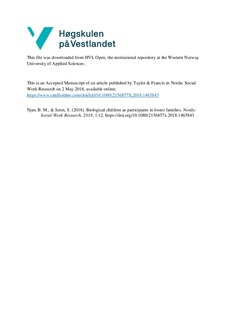Biological children as participants in foster families
Journal article, Peer reviewed
Accepted version

Åpne
Permanent lenke
http://hdl.handle.net/11250/2586048Utgivelsesdato
2018Metadata
Vis full innførselSamlinger
- Import fra CRIStin [3604]
- Institutt for velferd og deltaking [1007]
Originalversjon
Njøs, B. M., & Seim, S. (2018). Biological children as participants in foster families. Nordic Social Work Research, 2018, 1-12. 10.1080/2156857X.2018.1465843Sammendrag
In this article, we aim to provide insight into the experiences of biological children in foster families, in terms of their participation and involvement in the foster home. The article is based on an in-depth qualitative study of four children aged 11–14 years and four ‘adult children’ aged 22–30 years. This unique approach presents a comprehensive picture of growing up with foster siblings, including the ‘here-and-now’ perspective of children presently living in foster families, and the ‘looking back’ perspective of the ‘adult children’. Both groups perceived themselves as active participants in the early phases of the foster family. They felt involved in the family planning to invite a foster child, and they engaged with warmth and care in the everyday life with the foster sibling. In retrospect the adult children recollected more about the conflicts and strains of growing up in a foster families, especially in periods when the foster child needed much attention, or in case of unplanned removal of the foster sibling. They then felt excluded and that they had to cope with loss and sorrow alone. Despite this, three of the four adult children were planning to become a foster family themselves. The informants had not experienced support from the child protection services (CPS). We conclude that more research is needed to develop knowledge about biological children’s benefits and risks when growing up in foster families, about participation in the foster family life, and about participation in contact with the CPS.
Beskrivelse
Author accepted manuscript (post-print).